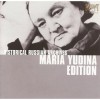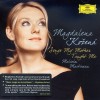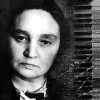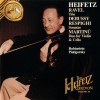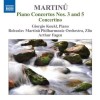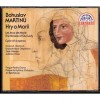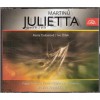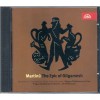Composers
Bohuslav Martinů (December 8, 1890 – August 28, 1959) was a prolific Czech composer of modern classical music. He was of Czech ancestry. Martinu wrote six symphonies, 15 operas, 14 ballet scores and a large body of orchestral, chamber, vocal and instrumental works. Martinů became a violinist in the Czech Philharmonic Orchestra, and taught music in his home town. In 1923 Martinů left Czechoslovakia for Paris, and deliberately withdrew from the Romantic style in which he had been trained. In the 1930s he experimented with expressionism and constructivism, and became an admirer of current European technical developments, exemplified by his orchestral works Half-time and La Bagarre. He also adopted jazz idioms, for instance in his Kuchyňské revue (Kitchen Revue).In the early 1930s he found his main font for composition style, the neo-classical as developed by Stravinsky. With this, he greatly expanded to become an amazingly prolific composer, composing volleys of well-crafted chamber, orchestral, choral and instrumental works, and was able to do this with amazing dispatch. His use of the piano obliggato became his signature. His Concerto Grosso and the Double Concerto for Two String Orchestras, Piano and Tympani are among his most powerful from this period. Among his operas, Juliette and The Greek Passion are considered the finest. He is compared with Prokofiev and Bartók in his innovative incorporation of Central European ethnomusicology into his music. He continued to use Czech and Moravian folk melodies throughout his oeuvre, usually nursery rhymes—for instance in Otvírání studánek ("The Opening of the Wells").
His great symphonic career began when he emigrated to the United States in 1941, fleeing the German invasion of France, to compose his six symphonies, which were performed by all the major US orchestras. There is evidence that Martinu had Asperger syndrome.This autistic condition rendered him to be a compulsive composer so he could compose with extraordinary ease. However, this gift caused his reputation to become suspect and was denigrated by some musicologists who, unable to explain it, cited him as a "flawed" composer, although no background to support this has been provided. In 1956, he returned to live in Europe and died in Switzerland in 1959. Only now is his reputation being resurrected with the support of newly discovered facts about his autistic personality.
Martinů was born in a church tower in Polička, Bohemia, where his father (a shoemaker) was a watchman. As a child he developed a local reputation, giving his first public concert in his hometown in 1905. In 1906 he became a violin student at the Prague Conservatory, where he studied briefly before being dismissed for "incorrigible negligence". He continued his studies on his own.
He spent the First World War in his home town as a teacher, where he pursued his interests in composition. He also joined the Czech Philharmonic Orchestra as a violinist. His ballet Istar was completed in 1922. He left Czechoslovakia for Paris in 1923, where he became a pupil of Albert Roussel, though he retained many links with his birthplace. When the German army approached Paris early in the Second World War, he fled, first to the south of France, and then to the United States in 1941, where he settled in New York with his French wife. Life in America was difficult for him, as it was for many of the other outstanding artists who arrived in similar circumstances. Lack of knowledge of English, lack of funds, and lack of opportunities to use their talents were problems common to all such émigré artists at first. However, Martinů did acclimatise himself. He composed a great deal and taught at the Mannes College of Music for most of the period from 1948–1956. His six symphonies were written in the eleven-year period 1942–1953, the first five being produced between 1942 and 1946.
His notable students include Alan Hovhaness, H. Owen Reed, Jan Novák, Vítězslava Kaprálová, Howard Shanet, Peter Pindar Stearns, and Burt Bacharach.
In 1953 Martinů left the United States for France and settled in Nice returning in 1955. In 1956 he took up an appointment as composer-in-residence at the American Academy in Rome. He died at a clinic in Liestal, Switzerland, on August 28, 1959.
Martinů was a prolific composer, who wrote almost 400 pieces. Many of his works are regularly performed or recorded, among them his choral work The Epic of Gilgamesh (1955); his six symphonies; his concertos, including those for cello, violin, oboe and five for the piano; his anti-war opera Comedy on the Bridge; and his chamber music, including seven string quartets, a piano quartet, a flute sonata, and a clarinet sonatina.
A characteristic feature of his orchestral writing is the near-omnipresent piano; many of his orchestral works include a prominent part for piano, including his small concerto for harpsichord and chamber orchestra. The bulk of his writing from the 1930s into the 1950s was in a neoclassical vein, but with his last works he opened up his style to include more rhapsodic gestures and a looser, more spontaneous sense of form. This is easiest to hear by comparing his sixth symphony, titled Fantaisies symphoniques, with its five predecessors, all from the 1940s.
One of Martinů's lesser known works is a piece featuring the theremin commissioned by Lucie Bigelow Rosen. Martinů started working on this commission in the summer of 1944 and finished his Fantasia for theremin, oboe, string quartet and piano on October 1, dedicating it to Rosen, who premiered the piece as theremin soloist in New York on November 3, 1945, along with the Koutzen Quartet and Robert Bloom.
His opera The Greek Passion is based on the novel of the same name by Nikos Kazantzakis.
His orchestral work Memorial to Lidice was written in remembrance of the village of Lidice that was destroyed by the Nazis in reprisal for the assassination of Reinhard Heydrich in the late spring of 1942. It was composed in 1943 whilst he was in New York.
Recently Added
Biography
Bohuslav Martinů (December 8, 1890 – August 28, 1959) was a prolific Czech composer of modern classical music. He was of Czech ancestry. Martinu wrote six symphonies, 15 operas, 14 ballet scores and a large body of orchestral, chamber, vocal and instrumental works. Martinů became a violinist in the Czech Philharmonic Orchestra, and taught music in his home town. In 1923 Martinů left Czechoslovakia for Paris, and deliberately withdrew from the Romantic style in which he had been trained. In the 1930s he experimented with expressionism and constructivism, and became an admirer of current European technical developments, exemplified by his orchestral works Half-time and La Bagarre. He also adopted jazz idioms, for instance in his Kuchyňské revue (Kitchen Revue).In the early 1930s he found his main font for composition style, the neo-classical as developed by Stravinsky. With this, he greatly expanded to become an amazingly prolific composer, composing volleys of well-crafted chamber, orchestral, choral and instrumental works, and was able to do this with amazing dispatch. His use of the piano obliggato became his signature. His Concerto Grosso and the Double Concerto for Two String Orchestras, Piano and Tympani are among his most powerful from this period. Among his operas, Juliette and The Greek Passion are considered the finest. He is compared with Prokofiev and Bartók in his innovative incorporation of Central European ethnomusicology into his music. He continued to use Czech and Moravian folk melodies throughout his oeuvre, usually nursery rhymes—for instance in Otvírání studánek ("The Opening of the Wells").
His great symphonic career began when he emigrated to the United States in 1941, fleeing the German invasion of France, to compose his six symphonies, which were performed by all the major US orchestras. There is evidence that Martinu had Asperger syndrome.This autistic condition rendered him to be a compulsive composer so he could compose with extraordinary ease. However, this gift caused his reputation to become suspect and was denigrated by some musicologists who, unable to explain it, cited him as a "flawed" composer, although no background to support this has been provided. In 1956, he returned to live in Europe and died in Switzerland in 1959. Only now is his reputation being resurrected with the support of newly discovered facts about his autistic personality.
Martinů was born in a church tower in Polička, Bohemia, where his father (a shoemaker) was a watchman. As a child he developed a local reputation, giving his first public concert in his hometown in 1905. In 1906 he became a violin student at the Prague Conservatory, where he studied briefly before being dismissed for "incorrigible negligence". He continued his studies on his own.
He spent the First World War in his home town as a teacher, where he pursued his interests in composition. He also joined the Czech Philharmonic Orchestra as a violinist. His ballet Istar was completed in 1922. He left Czechoslovakia for Paris in 1923, where he became a pupil of Albert Roussel, though he retained many links with his birthplace. When the German army approached Paris early in the Second World War, he fled, first to the south of France, and then to the United States in 1941, where he settled in New York with his French wife. Life in America was difficult for him, as it was for many of the other outstanding artists who arrived in similar circumstances. Lack of knowledge of English, lack of funds, and lack of opportunities to use their talents were problems common to all such émigré artists at first. However, Martinů did acclimatise himself. He composed a great deal and taught at the Mannes College of Music for most of the period from 1948–1956. His six symphonies were written in the eleven-year period 1942–1953, the first five being produced between 1942 and 1946.
His notable students include Alan Hovhaness, H. Owen Reed, Jan Novák, Vítězslava Kaprálová, Howard Shanet, Peter Pindar Stearns, and Burt Bacharach.
In 1953 Martinů left the United States for France and settled in Nice returning in 1955. In 1956 he took up an appointment as composer-in-residence at the American Academy in Rome. He died at a clinic in Liestal, Switzerland, on August 28, 1959.
Martinů was a prolific composer, who wrote almost 400 pieces. Many of his works are regularly performed or recorded, among them his choral work The Epic of Gilgamesh (1955); his six symphonies; his concertos, including those for cello, violin, oboe and five for the piano; his anti-war opera Comedy on the Bridge; and his chamber music, including seven string quartets, a piano quartet, a flute sonata, and a clarinet sonatina.
A characteristic feature of his orchestral writing is the near-omnipresent piano; many of his orchestral works include a prominent part for piano, including his small concerto for harpsichord and chamber orchestra. The bulk of his writing from the 1930s into the 1950s was in a neoclassical vein, but with his last works he opened up his style to include more rhapsodic gestures and a looser, more spontaneous sense of form. This is easiest to hear by comparing his sixth symphony, titled Fantaisies symphoniques, with its five predecessors, all from the 1940s.
One of Martinů's lesser known works is a piece featuring the theremin commissioned by Lucie Bigelow Rosen. Martinů started working on this commission in the summer of 1944 and finished his Fantasia for theremin, oboe, string quartet and piano on October 1, dedicating it to Rosen, who premiered the piece as theremin soloist in New York on November 3, 1945, along with the Koutzen Quartet and Robert Bloom.
His opera The Greek Passion is based on the novel of the same name by Nikos Kazantzakis.
His orchestral work Memorial to Lidice was written in remembrance of the village of Lidice that was destroyed by the Nazis in reprisal for the assassination of Reinhard Heydrich in the late spring of 1942. It was composed in 1943 whilst he was in New York.
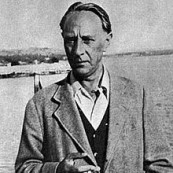

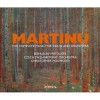
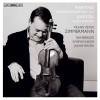
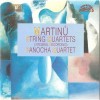
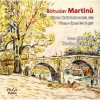
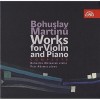

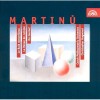
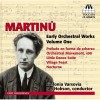
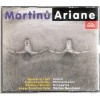
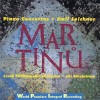



![Russian legends - David Oistrakh [20 CD]](http://static.classicalm.com/repository/collection-cover/small/267-img1318418713553266.jpg)
